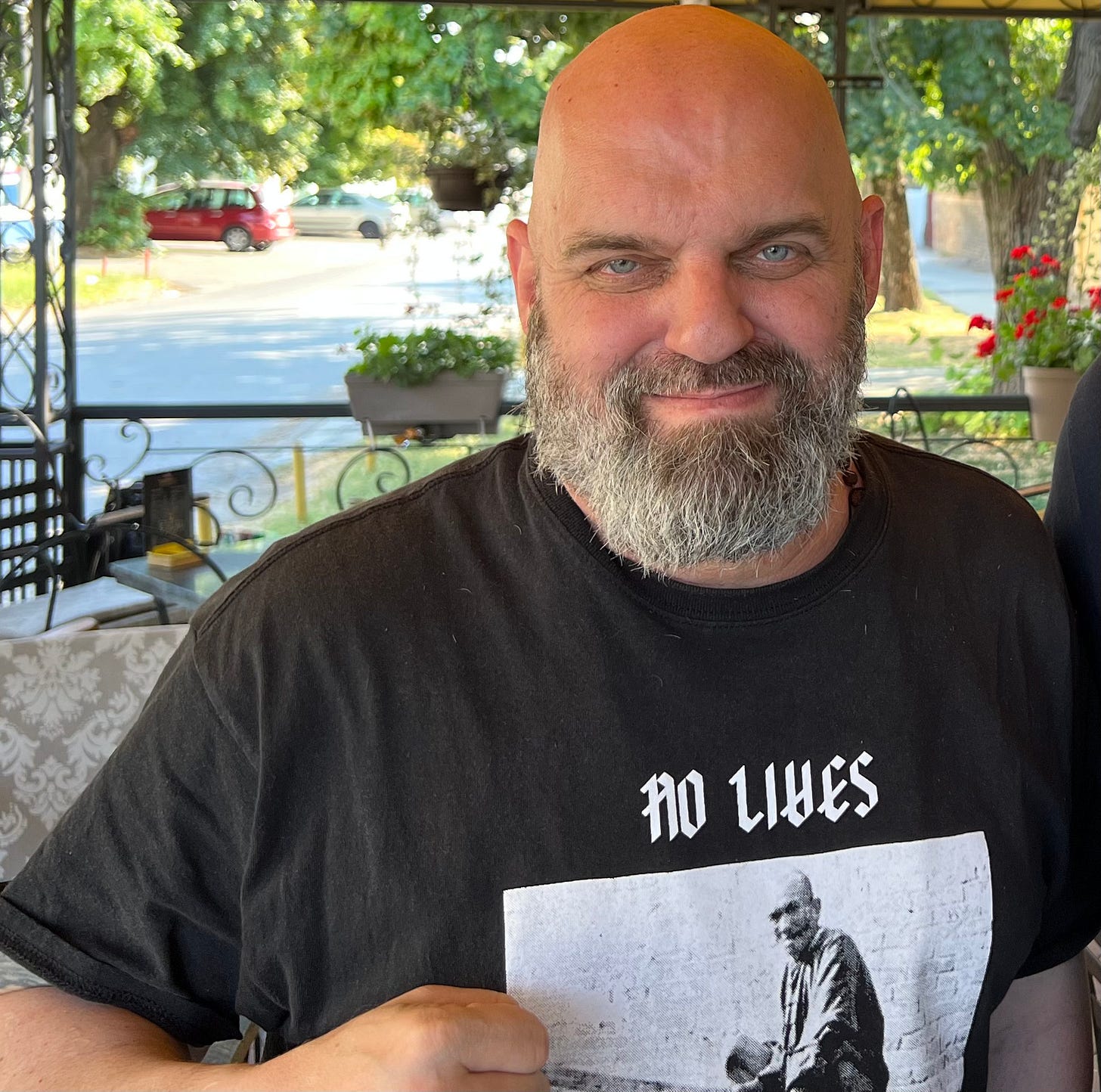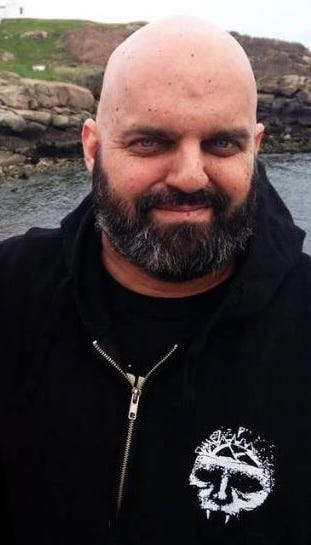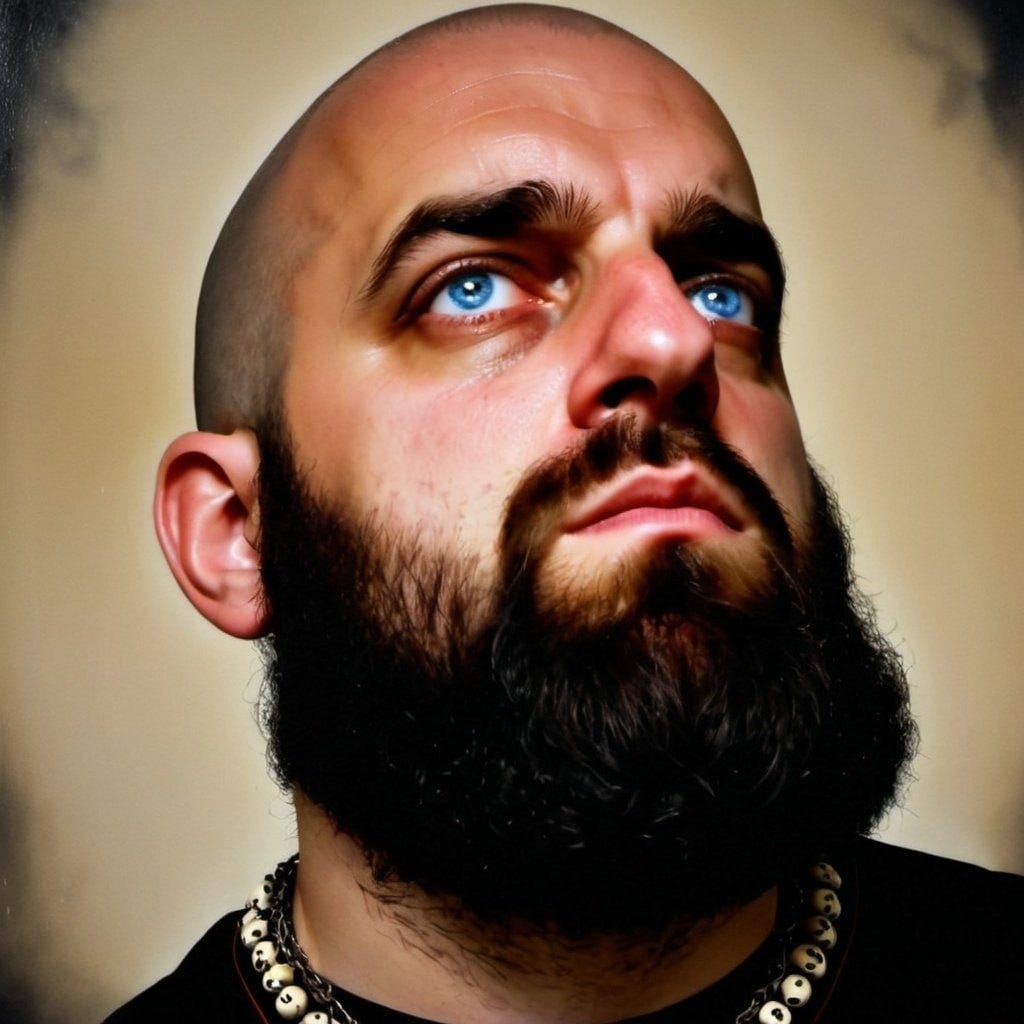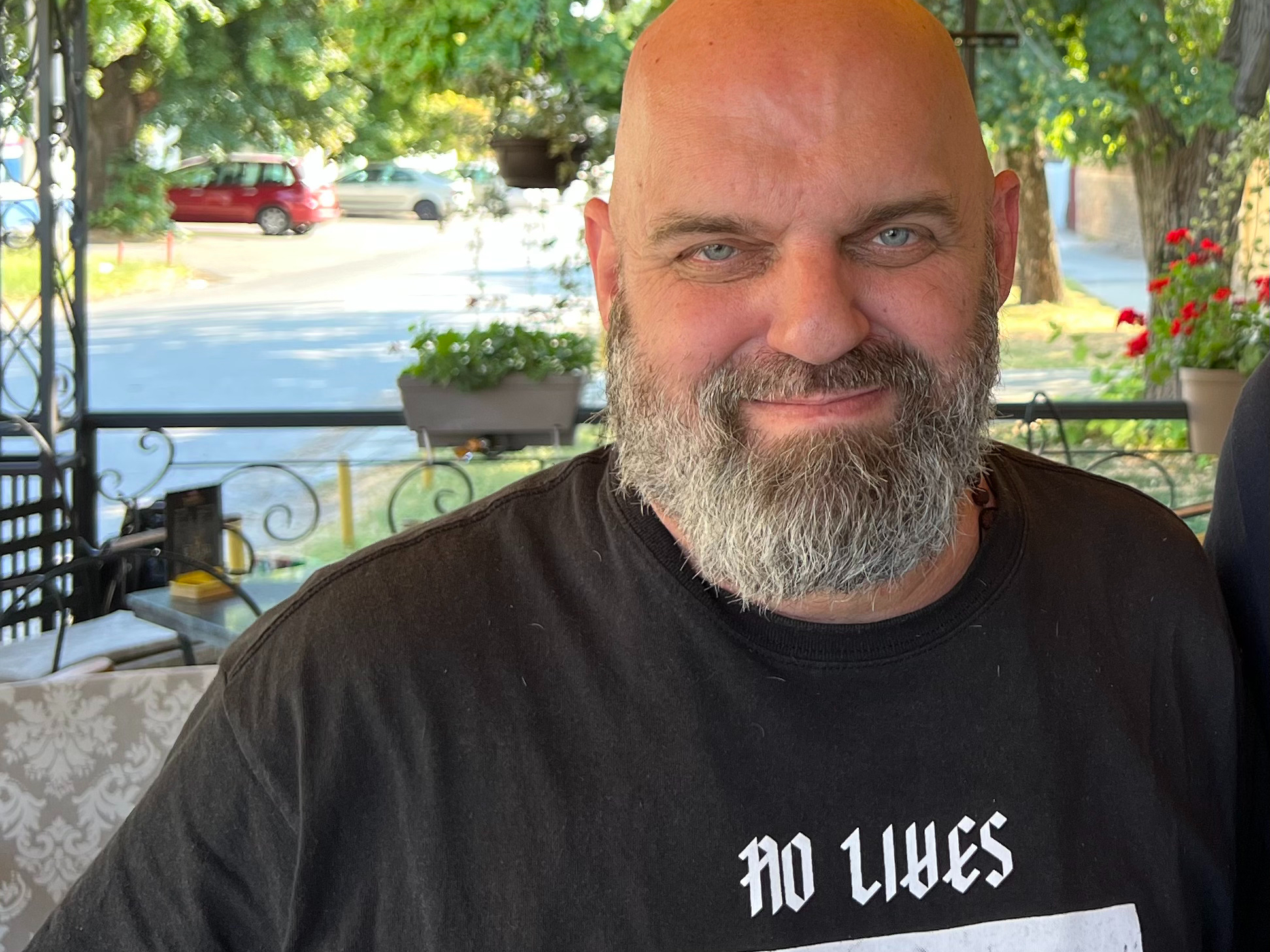
On April 28th, 2025, the anti-globalist cause lost one of its most iconic, controversial, and original voices and minds. James Porrazzo, born and raised in New York, passed away at the age of 53 in his newfound home in Novi Sad, Serbia.
Porrazzo’s life was a long-running and wide-ranging revolt against the modern world. His well-known maxims and battlecries included “Freedom! Justice! Revolution!”, “Defend Europe!”, “Defend Atlantis!”, and “Know Your History!”. As these and many other slogans and sayings associated with him symbolize, Porrazzo’s revolt assumed a colorful variety of political, spiritual, and editorial manifestations. The sheer range of the entities, currents, and influences in which Porrazzo was engaged, or which he himself initiated, was and remains far-flung enough so as to confound opponents, sympathizers, and onlookers alike. Porrazzo’s life and work spanned virtually a whole “era,” or even several “eras,” of recent history and the lives of more than a handful of organizations, individuals, and even countries.
Among the most visible and prominent political manifestations of his life path, Porrazzo’s name is inseparable from the very beginning of his “career” as a dissident, namely, his political activism with American Front and his turn to found New Resistance — both of which became the subject of his most (in)famous “exposé” by the so-called Southern Poverty Law Center. Through New Resistance and its organ under his editorship, Open Revolt!, Porrazzo played the historic role of introducing ideas and authors from the European New Right and the post-Soviet Russian landscape, most noticeably Alexander Dugin, to American dissidents in particular and, of course, the English-language virtual world at large, which in our digital days means virtually the entire world.
Open Revolt! published, among many other things, the first English-language interview with Daria Platonova Dugina, who was later gifted the rare token of one of New Resistance’s Green Star lapel pins. Receiving its name from Christian Bouchet’s Nouvelle Résistance and becoming the first American movement to promote Dugin’s Fourth Political Theory, Porrazzo’s New Resistance represented a trans-continental “Silk Road” of ideas and aesthetics, much of which foreshadowed, anticipated, and to varying extents influenced subsequent developments in North and South America and Europe.

After New Resistance’s splintering, and following his founding of the short-lived Archeofuturist Front, Porrazzo’s political activism transitioned into behind-the-scenes consulting and into the new media sphere. As for the latter, his various, often blocked pages and profiles eventually converged into Total War News, which went on to gain a quasi-cult-like following and to be cited by international media for, among other things, its coverage of Prigozhin’s Wagner operations in Ukraine and Africa, its “gonzo” journalism and geopolitical analysis, and Porrazzo’s merciless yet playful sense of humor.
Alongside or behind Porrazzo’s political and media faces, his lifelong spiritual seeking was less public, but by no means unknown or less prominent in his activities and relationships. In fact, all of Porrazzo’s public manifestations were rooted in his spiritual quest and occult apperception. Hailing from an Italian-American family involved with the Ordo Templi Orientis and immersed in all things magical, psychic, esoteric, and occult, Porrazzo was a “practitioner” from birth. In his words from a 2022 interview: “As soon as my brain could work, I was following the Left Hand Path.” By the latter, Porrazzo meant those traditions, movements, and practices which posit that the current dark of the cosmic cycle, the Kali-Yuga, calls for a transgressive, antinomian spirituality centered around self-realization while living through the fray of the modern world — or, as Julius Evola put it, “riding the tiger.”
Often accused of being a Satanist (a name-calling which he deemed “lazy”), Porrazzo referred to himself as an “Unorthodox Shaivite.” He believed — and integrated into his practice, encompassing all outlets — that modern European man has the unprecedented possibility and challenge of drawing on spiritual energies from diverse sources, Eastern and Western, ancient and modern, “authentic” and “idiosyncratic.” Hence, one could find Porrazzo contributing to organizations devoted to Krishna, expressing admiration for Orthodox Christianity, reciting the words of Odin from the Eddas, and advocating the study of Jewish religious history, all at the same time as he experimented with modern currents in magic which all of the preceding would treat as either farcical or nefarious.
Although he was not personally a fan of Guénon or much of what has become “canonical” Traditionalist literature, Porrazzo shared much of the Traditionalist vision, and he considered the publication of Evola’s works by Arktos to be one of the most important, positive developments of the 21st century. In turn, Porrazzo referred to the Atlantis Foundation, the last major project which he initiated towards the end of his life, as a “metaphysical project,” “spiritual think tank,” “intentional community,” and “mythology.” Even if he were to never have spelled out the latter in attachment to one project, those who knew Porrazzo knew that such a vision expressed his entire life work, otherwise scattered and refracted across so many “startups” and “fronts.”
In tune with his spiritual studies and sensitivities, Porrazzo left a less known but undoubtedly fruitful mark in the world of publishing as well. A disciple and collaborator of the late Adam Parfrey, Porrazzo was an avid supporter of the early Feral House. His promotional work in support of independent, dissident publishing extended to Arktos and to PRAV Publishing. Porrazzo contributed in manifold ways to a number of published titles, always without his name on them, yet left his own book projects unfinished. Porrazzo’s autobiography, commissioned by PRAV Publishing, was left unwritten.
His many articles and interviews are left scattered across numerous websites (many of them now defunct) in nearly half a dozen languages. The fate of his unfinished manuscripts remains uncertain, although it is known that the latter included a commentary on José Vasconcelos’ La raza cósmica, a book on Wagner, a treatise on meditation, and a series of essays on Atlantis. Like many of the thinkers and teachers of the ancient world, Porrazzo’s corpus was primarily oral, a matter of influential conversations behind the scenes, and remains the legacy of a small circle of receivers. Porrazzo was an “influencer” more so than an “author,” and few authors would dare to reveal their interactions with him or his comments on their works.
Furthermore, with respect to the written and spoken word, Porrazzo is also known to have had a hand in music. Between his youth spent in the New York hardcore scene and his last music project “Porrazzo & Red Mercury,” Porrazzo promoted Solimano Mutti’s T.S.I.D.M.Z. (ThuleSehnsucht In Der MaschinenZeit) and contributed to Steve Drakos’ Der Drakos and Front of Hell, writing the foreword to the latter’s Poems of Blood and Faith. Out of all the lyrics and tunes he composed and collaborated on, Porrazzo spoke of the Porrazzo & Red Mercury tracks “Makarov Gospel” and “Nuclear Dharma” as being the most expressive of himself.

As the news of Porrazzo’s passing reaches the wider (and flatter) world, it is only to be expected that his person, life, and works will soon be subjected to the habitual rounds of slander in the usual reductive and hackneyed fashions. Journalists will pretend to be objective about the death of a “far-right extremist” and present a list of thought-crimes, insinuating that the world is now a better place without him; those on the Right and on the Left, and in-between and beyond, who crossed swords with Porrazzo will have the occasion to unfold a laundry list of disagreements and supposed wrongdoings; and, in general, many of those who crossed paths with Porrazzo on one of his many fronts across times and places will struggle to weigh and reconcile all the disagreements, inconsistencies, and bewilderments that Porrazzo either represented to them or brought out in them.
Only one thing is certain: an online search of Porrazzo’s name (almost always misspelled) and the imminent comments in the wake of his passing will surely give the impression that the man stands accused of everything and of nothing. Such, perhaps, is the case of lives that are lived beyond their own time, out of step, against the grain, and with absolutely no shame for participating in the great Divine Game of the universe. In any case, the death of James Porrazzo represents the end of an era, the end of a life embodied and lived out through many of the radical undercurrents that rush under the concrete of the illusory “world order” and occasionally erupt with a vengeance. Without a doubt, Porrazzo’s ghost will continue to haunt above ground as well as the underground.
Amidst all of his movement(s), among all the continents and countries that his voice and influence reached, and in all his restlessness, Porrazzo nevertheless found a sense of peace in his place of death. In his later adult life, Porrazzo had the dream of returning to Continent Europe, of being based in and on European soil — but on the “Atlantean” soil of unbowed Europe, not under Atlanticist occupation. Thus, Porrazzo realized one of his dreams and moved to Serbia, a country and people dear to his heart ever since his opposition to the NATO dismembering of Yugoslavia and demonization of the Serbs in the 1990s. Although the thought of dropping everything and living the life of a nomad across South America or Southeast Asia or joining forces with a warlord somewhere in Africa never left him, he resolved to stay in Serbian Europe no matter the circumstances in which he found himself. It is no exaggeration to say that Porrazzo goes down in history, or rather lives on in fond memory, as one of the most peculiar and most welcomed Americans in recent Serbian memory.
Furthermore, Porrazzo’s eternally restless soul lives on in the idea and teaching that motivated all of his undertakings, the so-called “Porrazzo Doctrine” that he consistently imparted: in the midst of the Kali-Yuga, each of us is given the chance to become and to be someone and something standing out from the boring, hopeless herd — yet this herd is not only apart from us somewhere out there, but is also among us and within us as well. Therefore, constant (self-)vigilance and reawakening are always the order of the day and night. Other than that, “No Lives Matter.”
In our conditions, he would often say, it would be far more truthful and Divine to be a pirate, a raider, a mercenary, a spin-doctor, or a chaos magician forging and hammering out their own code, rather than to identify with one organization, ideology, party, country, or another. There are no parties or ideologies in Valhalla, so to speak. According to Porrazzo, only through radical, transgressive dissidence and “riding the tiger” of the Postmodern world can contemporary man rediscover and reproduce the original spirituality and ethos of the Indo-European horsemen of the steppes and the seafarers of Atlantis, that is, the adventurous radicals who lit the sacrificial fires and forged the foundations of the now crumbling facade we call “civilization.”
Uplifting more than a few and upsetting many, always with the goal of keeping the tiger on its toes, the would-be zookeepers at bay, and its daring riders ready for all twists and turns, Porrazzo raised and enraged at least two generations. Whether the world will be a lonelier and more boring place without him depends on them.








